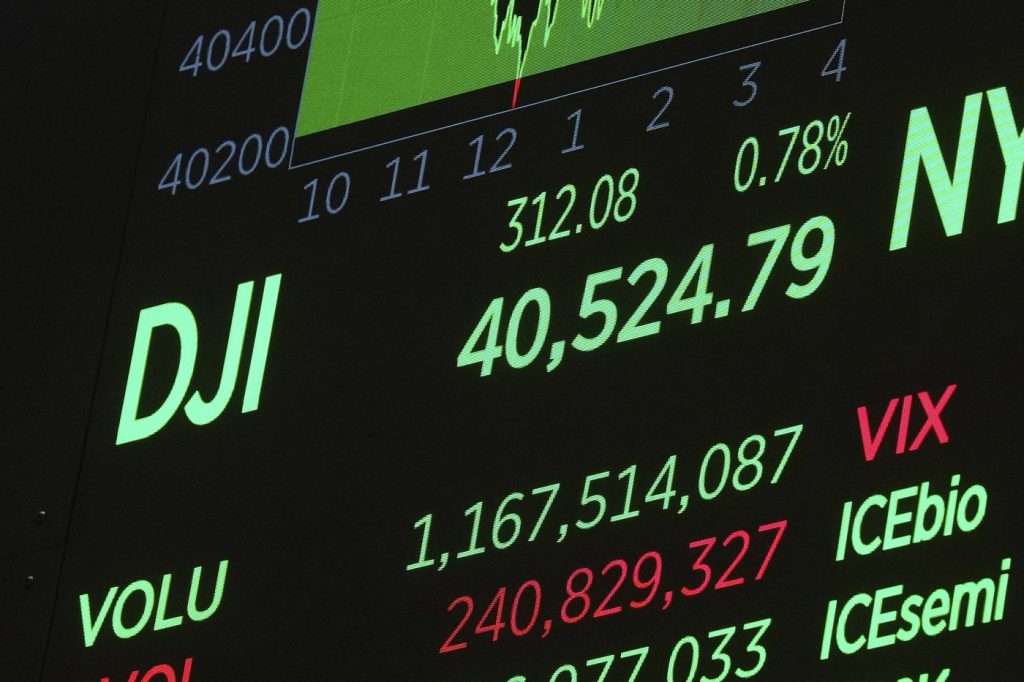TOKYO (AP) - Asian benchmarks saw an upward trend on Tuesday, reflecting a rally on Wall Street initiated by President Donald Trump’s temporary relaxation of certain tariffs. This easing of tariffs on electronics has alleviated some stress in the U.S. bond market, contributing to a more favorable environment for investors.
Japan's benchmark Nikkei 225 advanced by 0.9%, closing at 34,336.74. Among the top gainers were major automakers, with Toyota Motor Corporation’s shares surging by 4.9%, and Honda Motor Company gaining 4.8%. Additionally, electronics and entertainment giant Sony Corporation saw a 3.1% increase in its stock price, while Nintendo rose by 0.3%. Semiconductor manufacturer Tokyo Electron’s stock improved by 1.1%, with Renesas gaining 1.4%.
In Australia, the S&P/ASX 200 rose by 0.5%, reaching 7,787.40. Likewise, South Korea's Kospi experienced an uptick of 0.8%, rising to 2,475.25. However, Chinese stocks exhibited volatility. Hong Kong's Hang Seng index fluctuated, ultimately inching up by less than 0.1% to 21,423.44. The Shanghai Composite Index, on the other hand, fell by 0.1%, settling at 3,260.55.
Market analysts reflected on the unpredictability of Trump's tariff policy, characterizing it as a pattern of significant policy changes followed by temporary reprieves. Stephen Innes, managing partner at SPI Asset Management, remarked on this erratic behavior, suggesting it resembles a game of whack-a-mole where ongoing market management has led to confusion among investors.
On the previous day, the S&P 500 climbed by 0.8% to finish at 5,405.97, with the Dow Jones Industrial Average also rising by 0.8% to reach 40,524.79. The Nasdaq composite witnessed a less pronounced increase of 0.6%, closing at 16,831.48. The bounce in equity markets was significantly influenced by Trump's announcement exempting smartphones, computers, and other electronics from new tariffs that could otherwise escalate prices dramatically for U.S. consumers. Such an exemption means that U.S. importers can avoid choosing between raising prices for customers or sacrificing profit margins.
As a result of the optimistic tariff news, Apple’s stock gained 2.2%, while Dell Technologies saw an impressive rise of 4%. Automakers also benefited from the news, with Trump hinting at possible tariff pauses for the auto industry. General Motors’ shares increased by 3.5%, and Ford Motor Company saw a rally of 4.1%. Despite this temporary relief, many investors remain cautious, aware that the exemptions may not last.
The unpredictable nature of Trump’s tariff announcements has created an atmosphere of uncertainty for both consumers and businesses. Financial markets have experienced volatile swings as investors grapple with the continual changes in tariff policies. Added to this complexity, signs of instability in the bond market were noted last week, with significant fluctuations in Treasury yields.
The bond market seems to have stabilized after recent turmoil, with Treasury yields falling back to 4.35% as of early Tuesday from a peak of 4.48% just days prior. Rising yields typically indicate increased fear in the market, as U.S. government bonds are regarded as safe investments. Interestingly, while U.S. households have increased their short-term inflation expectations, their long-term outlooks for inflation have either remained unchanged or declined. This trend presents a potentially encouraging sign for the Federal Reserve, as entrenched long-term inflation expectations can lead to problematic economic behavior.
In commodity markets, benchmark U.S. crude oil saw a slight increase of 17 cents to reach $61.70 a barrel, while Brent crude rose by 16 cents to $65.04 a barrel. The U.S. dollar appreciated against the Japanese yen at 143.14 from the previous rate of 143.04, while the euro marginally decreased to $1.1346 from $1.1351.










